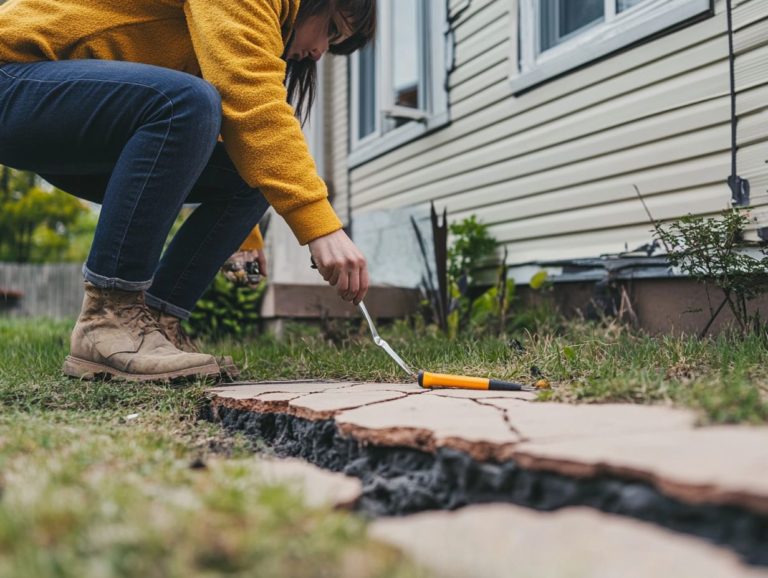Closing Costs Explained for First-Time Home Buyers
Buying your first home is not just thrilling; it s a life-changing adventure! Yet, it comes with important financial responsibilities that extend well beyond the down payment.
One of the most critical aspects, often overlooked, is closing costs. These expenses can significantly affect your overall budget. Understanding them is vital for informed decision-making.
This guide will break down what closing costs entail and delve into their importance. We ll also offer practical tips on how to prepare for and potentially minimize these expenses.
Whether you re just starting your home-buying journey or nearing the finish line, this guide will empower you to feel confident about your finances.
Contents
Key Takeaways:

Closing costs are the fees you pay when buying a home. They can significantly impact the total cost of your purchase.
First-time home buyers should be aware of common closing costs, including appraisal fees, title insurance, and attorney fees. It s important to budget and negotiate for these expenses.
There are ways to reduce closing costs, such as researching and comparing service prices, asking the seller to cover some costs, and negotiating with lenders. Understanding the difference between closing costs and the down payment is also essential.
What are Closing Costs?
Closing costs are an important part of your real estate transaction. They play a substantial role in the overall cost of homeownership.
These expenses include various fees, such as mortgage closing costs, title insurance, origination fees, and underwriting fees. Specific costs can vary based on your location and the details of the transaction.
Understanding these costs is essential for any homebuyer. They significantly influence the total expense of purchasing a home and can shape your financial decisions during the closing process. To navigate this better, it’s important to explore the home buying process for new buyers.
Definition and Breakdown of Expenses
Closing costs involve several fees associated with purchasing a home. These can differ based on location and lender requirements.
Common components include application fees, title search fees, property appraisal fees, and escrow fees. All of these contribute to your total closing costs.
- Application fees typically range from $300 to $500. They cover the lender’s loan processing.
- Title search fees, usually between $200 and $400, ensure that the title is free from any issues.
- Property appraisal fees, necessary for assessing the property’s market value, generally fall between $300 and $700.
- Escrow fees can vary widely and usually amount to about 1% of the home price. They play a crucial role in managing funds during the transaction.
Recognizing these components helps you budget effectively. It also offers a clearer perspective on the true cost of homeownership.
Why are Closing Costs Important?
Closing costs are an important part of the overall expense of purchasing a home. They affect your choices significantly and the long-term advantages of homeownership.
Understanding these expenses is crucial for first-time and low-income homebuyers. They affect the affordability of a home.
By accurately accounting for these costs, you can navigate the financial implications of a real estate transaction with confidence. This paves the way for well-considered choices and a smoother closing experience.
Impact on Overall Cost of Buying a Home
The impact of closing costs on the overall cost of buying a home is considerable, potentially adding thousands of dollars to the final price you ll pay. These expenses, which can include fees paid upfront to lower your mortgage interest rate and property taxes, can easily overwhelm first-time homebuyers if not properly factored into your budgeting and financial planning.
Therefore, understanding closing costs is key to a smart home purchase. This understanding enables you to make informed purchasing decisions.
Besides mortgage points and property taxes, you ll want to keep an eye on additional fees such as:
- Appraisal costs
- Title insurance
- Attorney fees
All of these contribute to that closing tally.
To navigate these financial hurdles, you can implement strategies like:
- Shopping around for better rates on services
- Negotiating seller concessions, which are discounts or payments made by the seller to help cover closing costs
- Incorporating these expenses into your budget from the very beginning
By approaching the home-buying process with a comprehensive financial plan, you can soften the blow of closing costs. This ensures a smoother transition into homeownership while still keeping your long-term financial goals intact.
Typical Closing Costs for First-Time Home Buyers

First-time homebuyers frequently face a range of typical closing costs that can accumulate swiftly. It is crucial for you to comprehend and prepare for closing costs to avoid any financial surprises on closing day.
Common costs you might encounter include:
- Home inspection fees
- Title insurance
- Origination fees
Along with other expenses such as discount points and prepaid homeowners insurance. Seller concessions may assist in alleviating some of these costs, enabling you to navigate your real estate transaction more effectively while ensuring you align with the average closing costs for your area.
List of Common Expenses
A comprehensive list of common expenses tied to closing costs awaits your attention. This encompasses various fees you should be keenly aware of to ensure a smooth transaction on closing day.
Typical charges may include:
- Title insurance
- Origination fees
- Recording fees
- Other costs that can fluctuate based on the specifics of your real estate transaction and local regulations.
Understanding these costs is vital for you as a prospective buyer, as they can significantly impact your financial planning. For example, title insurance typically ranges from $1,000 to $3,000, offering protection against potential legal issues surrounding property ownership.
Origination fees, usually around 0.5% to 1% of the loan amount, cover the lender’s processing costs and should certainly be on your radar. Recording fees, essential for officially documenting the transfer of property, can vary considerably by location, generally falling between $50 and $250.
Familiarize yourself with these expenses to better prepare for the financial commitment involved in closing. This ultimately facilitates a more seamless acquisition of your new home.
How to Prepare for Closing Costs
Preparing for closing costs is an essential step for homebuyers, requiring meticulous budgeting and a clear understanding of the various fees tied to a real estate transaction.
By leveraging tools such as a loan estimate and closing disclosure, you can uncover potential expenses and craft effective budgeting strategies. This ensures you have ample funds ready for closing day.
Additionally, engaging in negotiations over certain fees can yield noteworthy savings. This underscores the importance of being proactive in understanding and managing your closing costs.
Budgeting and Negotiating Strategies
Using effective budgeting and negotiating strategies can significantly ease the financial burden of closing costs as you prepare for your real estate transaction.
By anticipating average closing costs for 2024 and understanding which fees are negotiable, you can manage your budget and discover potential savings through seller concessions and other smart tactics.
Having a clear grasp of typical fees, such as appraisal costs, attorney fees, and title insurance, enables you to pinpoint areas where you can save money before they become a surprise. It s essential to research these expenses and ask your lender for a list of costs.
Keep in touch with both sellers and lenders; don t hesitate to ask for adjustments or inquire about waivers for certain fees.
Being well-informed about the closing process enhances your bargaining power and makes it easier for you to advocate for yourself and secure better terms on your home purchase.
Ways to Reduce Closing Costs
Homebuyers have a wealth of effective strategies to reduce closing costs, ultimately lowering overall expenses and making the dream of homeownership more achievable.
Consider options like a no-closing-cost mortgage or negotiating seller concessions; these tactics can significantly alleviate the financial burden tied to real estate transactions.
Staying informed about various fees helps you minimize your costs, putting you in a stronger position as you embark on this exciting journey.
Tips for Lowering Expenses

Applying smart tips to cut expenses can drastically lower your closing costs!
As a buyer, it’s crucial to be proactive in inquiring about lender fees, real estate agent commissions, and transfer taxes, since these costs are often negotiable or reducible.
Understanding the breakdown of these closing costs is essential. Many lenders are willing to offer competitive rates or even waive certain fees entirely if you simply ask.
Negotiating real estate commissions directly with agents can result in more favorable terms, especially when multiple offers are on the table.
Being aware of transfer taxes in your local jurisdiction can open doors for exemptions or reductions based on specific conditions. Gaining insight into market trends enables you to negotiate more effectively and minimize your financial burden.
Closing Costs vs. Down Payment
Understanding the difference between closing costs and down payments is essential for anyone considering purchasing a home, as both entail significant financial commitments in the journey of homeownership.
The down payment is a percentage of the home s purchase price that you ll need to pay upfront, while closing costs cover a range of fees necessary to finalize the real estate transaction.
This distinction is particularly vital for first-time and low-income homebuyers who may turn to programs like FHA loans, VA loans, or Conventional loans with down payment assistance, which can help ease some of these financial pressures.
Understanding the Difference
Understanding the distinction between closing costs and down payments is crucial for your financial planning, as each represents unique obligations on your home-buying journey.
Closing costs encompass various fees, such as title insurance and underwriting expenses, while the down payment signifies your upfront investment in the property’s purchase price.
For example, if you’re eyeing a $300,000 home, a 20% down payment would amount to $60,000. This substantial sum could significantly lower your monthly mortgage payments and may even allow you to bypass private mortgage insurance (PMI).
On the other hand, closing costs can fluctuate between 2% and 5% of the loan amount, potentially adding another $6,000 to $15,000 to your initial financial responsibilities.
By comprehending how both components shape your budget, you can align your finances and objectives more effectively. Knowing when and how these costs are incurred can enhance your decision-making, ultimately influencing long-term benefits like equity accumulation and financial security.
Now that you know how to navigate closing costs, start planning your home purchase today!
Frequently Asked Questions
What are closing costs?
Closing costs are the fees you pay when buying a home. They cover various services and taxes needed for the purchase.
Are closing costs the same for all home buyers?

No, closing costs can change based on where you buy, the type of property, and the home’s price. Each buyer has different costs based on their situation.
What is included in closing costs?
Closing costs usually include fees for the home appraisal, title search, and title insurance. They may also cover loan origination fees, attorney fees, taxes, prepaid interest, and homeowners insurance.
Can closing costs be negotiated?
You can negotiate some closing costs with the seller or lender. However, certain fees, like government taxes and recording fees, are fixed and can’t be changed.
Do first-time home buyers have to pay closing costs?
Yes, first-time home buyers must pay closing costs, just like everyone else. There are programs and grants available to help cover these expenses.
How much should I expect to pay in closing costs as a first-time home buyer?
As a first-time buyer, expect closing costs to be 2-5% of the purchase price. It’s essential to budget for these expenses and gain insight into understanding the costs of homeownership when buying your first home.






